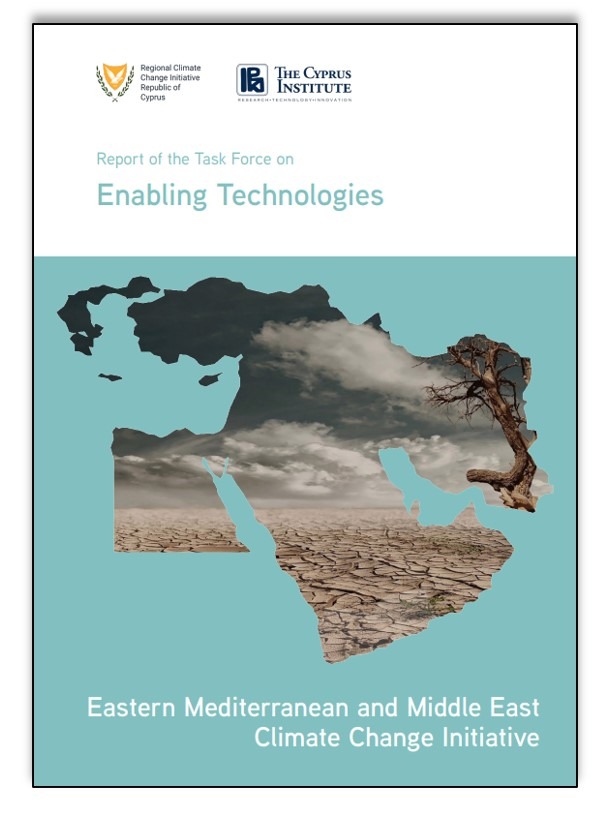
Enabling Technologies
The report proposes specific Enabling Technologies to address Climate change challenges. At the core of the recommendations of the Task Force on Enabling Technologies is a regional collaboration for the development of a system for the provision of Climate Services. This system, the Climate Services Hub (CSH), will facilitate better management of the risks of climate variability and change in climate-sensitive productive sectors, for instance, agriculture, energy, tourism, food security, etc. as well as in disaster risk management and resource management. A description of the CSH is provided along with recommendations for the evaluation of its impact.
The report explores the potential of Enabling Technologies to assess climate risks as well as to support climate change mitigation and adaptation plans in the Eastern Mediterranean and Middle East (EMME) region. Developments in the field of Enabling Technologies, such as digitalization, remote sensing, artificial intelligence, machine learning, visualization, etc. are described, whereas the applicability of Enabling Technologies is examined through specific case studies at the regional, national or local (city) levels.
The applications of Enabling Technologies are wide ranging and include: the monitoring of extreme weather events potentially linked to climate change, the assessment of the state of thermal environment in urban areas, the combined use of climate and geospatial data to depict climate risks and assess vulnerability to climate change, the prediction of climate change impacts both temporally and spatially, the association of climate change to energy production and consumption, etc.
At a second stage, the report examines other initiatives regarding Climate Services, defines the prerequisites for the EMME region CSH and describes the architecture as well as the various (interconnected) modules of the Hub.
Finally, fostering international cooperation for knowledge and technology transfer as well as for education and training are discussed taken that they are considered keyways through which enabling technologies can be leveraged for the benefit of all.
(Click here to download the report in .pdf format)
Abstract from the Report of the Task Force on the Enabling Technologies
Climate change and its effects pose substantial challenges for the countries of the Eastern Mediterranean and Middle East (EMME). Those challenges require well-designed adaptation and mitigation plans supported by enabling technologies such as Earth observation, geographic information systems, artificial intelligence, machine learning, visualisation, digitilisation, the Internet of Things and data-sharing systems. A system of advisory climate services conceived by and for the countries of the region will facilitate the design, implementation and monitoring of planned interventions for adaptation and mitigation.
Developments in enabling technologies are described, and their applicability examined through examples at the regional, national and municipal levels. Special attention is given to the preconditions for scalable deployment and adoption of enabling technologies in the region. The affordability of and access to enabling technologies are also explored. Secondly, the report examines the potential of integrated systems known as climate services. Based on enabling technologies, climate services are designed to support
1) assessments of the spatial impacts of climate change now and in the future;
2) tailored products to address the links betweem climate change and sectors such as energy, agriculture and
the urban environment; and
3) policies to mitigate and adapt to climate change.
Climate services are ideally provided through a proposed Climate Services Hub consisting of several interconnected modules.

Task Force
Task Force Coordination
Prof. Constantinos Cartalis, National and Kapodistrian University of Athens
Cyprus Institute Liaison Scientist
Dr. George Tsouloupas
Task Force Members
Ass. Prof. Fodil Fadli , Qatar University
Prof. Diofantos Hadjimitsis, Cyprus University of Technology
Associate Prof. Kareem Tonbol, Arab Academy for Science, Technology & Maritime Transport
Dr. Konstantinos Philippopoulos, National and Kapodistrian University of Athens
Prof. Jean Sciare, The Cyprus Institute
Associate Prof. Hameed Sulaiman, Sultan Qaboos University
Prof. Michalis Vrekkousis, University of Bremen

